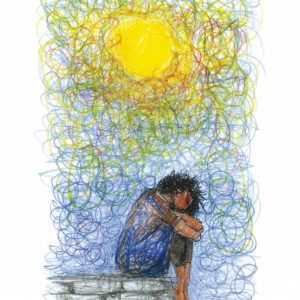
Story:
From the moment this young mother was pulled from the waters of the Mediterranean, she was desperate to find her young daughter. “Mia bambina!” she cried, over and over. “My daughter! My daughter!” She clung to the hope that her little girl would be found alive. It was as if hope itself were her lifeboat. Even after she had been transferred to a refugee center in Catania, Sicily, she continued to ask for her daughter. Eventually, the aid workers confirmed that the little girl had fallen into the water and drowned. In that moment, Francesco Piobbichi writes, it was as if “the sun became cold.” Silence fell over them and there were “no more words.”
Bible Reading: 2 Samuel 18:33 (NRSV)
When King David heard the news that his son, Absalom, was dead, he was “deeply moved, and went up to the chamber over the gate, and wept; and as he went, he said ‘O my son Absalom, my son, my son Absalom! Would that I had died instead of you, O Absalom, my son, my son!”
In that moment, David was not responding as a king, but as a father. It didn’t seem to matter to him that Absalom had betrayed him, or that his own reaction was perceived as the height of ingratitude by his war-weary troops (see 19:1-8). Until the evidence was incontrovertible, he had continued to hope. The first words out of his mouth when the messenger came with the news were, “Is it well with the young man Absalom?”
When I look as Francesco Piobbichi’s drawing of the young mother hoping against hope that her daughter will be found alive, I do not see a refugee. I see a mother. And for me, the sun becomes cold, and there are no more words.
Discussion/Reflection:
- Have you ever clung to hope in the face of all the evidence? What was it like? How does that experience help you to empathize with the mother in this story? With David?
- How does the contemporary story help you to appreciate the aid workers who seek to assist refugees?
Action:
- Read about a recent rescue on the island of Lampedusa, and Italian government’s attempts to block rescue efforts: May 5, 2019 Rescue
- Reach out to someone who has recently suffered a profound loss.
Prayer: We know that you are a God who sees our misery and hears our cries. Hear the cries of all whose hearts are broken. Soften the hearts of those who have it within their power to alleviate suffering. Amen
Welcoming the Stranger Series
In the last ten years more than 35,000 asylum seekers have died in the Mediterranean. Desperate to escape untenable situations in countries like, Syria, Eritrea, Sudan, and Somalia, refugees risk both life and livelihood to board rickety boats bound for what they hope will be a new life in Europe. Many of them die within sight of what they hoped would be the promised land.
Welcoming the Stranger is a devotional series designed to help Christians connect this unfolding humanitarian crisis in the Mediterranean with the Bible’s call to “welcome the stranger.” Recognizing that “the stranger” can sometimes be an abstraction that blinds us to the face of Christ, the series approaches the refugee crisis from a personal perspective. Each entry focuses on one person’s story, brought vividly to life by Italian artist and relief worker, Francesco Piobbichi. These stories are then linked to relevant Scripture, prayer, discussion, and action prompts.
Immigration is a hot topic around the globe, and the Bible passages in this series speak to wherever we are called to “welcome the stranger.” My specific interest in the Mediterranean context was sparked by a 2016 trip to the island of Lampedusa—a small island off the coast of Sicily that is the scene of so much hope and tragedy for refugees trying to enter Europe via small, unsafe boats. In addition learning about the situation there and the work being done by ecumenical groups like Mediterranean Hope, I spent significant time interviewing Francesco Piobbichi, whose art documents the stories of individual refugees and families who often die trying to reach safety. You can learn more about him and work through the following link: Francesco Piobbichi’s Artwork Each of his “snapshots” tells a story—sometimes of triumph, but often of tragedy: Piobbichi’s goal is to help people understand this large-scale human tragedy on a more personal level. My goal in this series is to use Piobbichi’s art as a starting point for Bible study and personal reflection/action.
